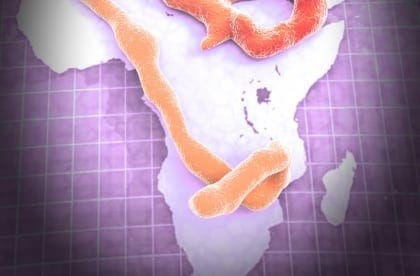
Ebola kills 9 out of 10 times and have already taken 700 lives in the most recent outbreak. Now authorities fear the virus might ‘hitch-hike’ to Australia.
The fact that Ebola spreads silently and quickly has Australia authorities skittishly monitoring border entry points throughout the country, which have all been placed on high alert for people who could be displaying symptoms.
Following a meeting between government health officials and border protection agencies last week, a plan was put in place to protect Australia from the spreading of the disease.
The international health community has warned that the disease could, for the first time, spread beyond Africa.
Two American doctors are known to have contracted the deadly disease while working in Africa to combat the virus, the first being admitted to a US hospital at the weekend while the second is understood to be returning to the US on Tuesday for treatment.
With no cure, this deadly virus is treated symptomatically and by placing persons diagnosed with the disease in quarantine.
“Everyone is on alert, and we have the best border protection for infectious disease system in the world,’’ said Professor Chris Baggoley, Australia’s chief medical officer. Professor Baggoley spoke at a meeting of the Communicable Diseases Network of Australia.
More than 200 Australians living and working in the outbreak-affected areas, most of who are in Nigeria, have registered on the government’s Smartraveller website.
A spokesman for the Department of Foreign Affairs said the government had been in contact with each of those travellers and expats to update them with the latest information on Ebola.
Alexander Khromykh, Professor of Molecular Virology at the University of Queensland said it is extremely difficult to treat a person who has contracted the virus.
He said the virus initially manifests in flu-like symptoms but quickly turns into a haemorrhagic disease which includes bleeding in the eyes, internal organs and skin haemorrhages.
Ebola is not air-borne, but is spread through contact with bodily excretions including, saliva, semen and urine. Making contact with a much as the tears of an infected person could infected a healthy person.
In addition, the virus does not die with the human body and remains active. Contact with a corpse could also result in infection.

The virus is formed in fruit bats and humans become carriers when they are bitten by, or eat these bats – something which is common practice in West African nations.
The current outbreak is reportedly the worst in history. On Sunday, Tom Frieden, the director of the Centers for Disease Control and Prevention in the US, described the Ebola situation in West Africa as now “out of control” but insisted it could be contained with “tried and true” public health measures.
The outbreak has even claimed the life of Dr Sheik Humaar Khan, Sierra Leone’s chief Ebola expert.
“The virus, hitchhiking across borders for the first time aboard airliners, could spell new flight restrictions aimed at containing outbreaks,” said Secretary for the International Civil Aviation Organization, Raymond Benjamin.











